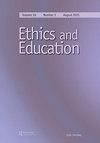Playing it by ear: potential as an improvisatory practice
IF 0.7
Q3 EDUCATION & EDUCATIONAL RESEARCH
引用次数: 0
Abstract
ABSTRACT This paper explores the concept of potential through a Deleuzean lens and argues that what is commonly understood as potential is often confused with possibility. It moves through four parts: an introduction exploring the language and context in which potential is ordinarily used in order to uncover underlying presuppositions; the next section explores key concepts from Difference and Repetition- namely the Dogmatic Image of Thought, Virtuality and Actuality- to illuminate ways in which a more nuanced concept of potential might be understood, arguing that it is a creative process, rather than a fixed characteristic. Next, it explores how improvisation is a way in which potential can be experienced, before finally considering how changes to education practice- specifically a move towards a more mechanised, digitally-orientated world- might be wholly irreconcilable with potential as a creative process of encountering, and risks a much more impoverished concept that is liable to concretion.随机应变:即兴练习的潜力
本文从德勒兹的角度探讨了势的概念,并指出通常被理解为势的东西往往与可能性相混淆。全文共分四个部分:绪论部分探讨潜在词通常使用的语言和语境,以揭示潜在的预设;下一部分探讨了《差异与重复》中的关键概念——即思想的教条式形象、虚拟性和现实性——阐明了如何理解更细微的潜力概念,认为它是一个创造性的过程,而不是一个固定的特征。接下来,它探讨了即兴创作如何成为一种体验潜力的方式,最后考虑了教育实践的变化——特别是向更加机械化、数字化的世界的转变——如何与潜力作为一种创造性的相遇过程完全不可调和,并冒着一个更贫困的概念的风险,这一概念容易凝固。
本文章由计算机程序翻译,如有差异,请以英文原文为准。
求助全文
约1分钟内获得全文
求助全文

 求助内容:
求助内容: 应助结果提醒方式:
应助结果提醒方式:


